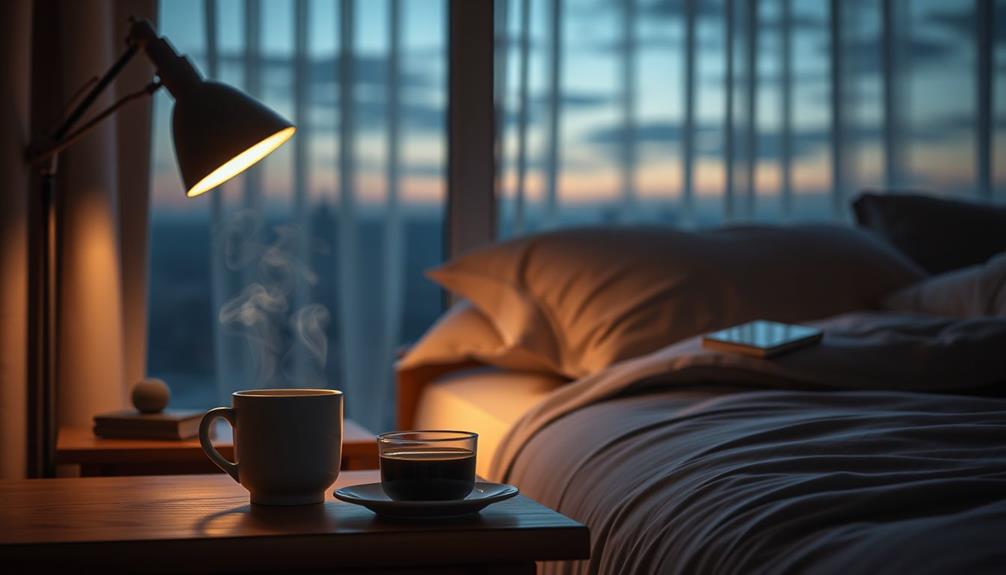Caffeine can really affect your sleep quality, especially if you consume it too late in the day. To find the right balance, try avoiding caffeine at least six hours before bedtime. Monitoring your intake is key—most adults can safely enjoy up to 400 mg a day, but individual sensitivity varies. If you struggle with sleep, consider healthy alternatives, like herbal teas, and try techniques like the Nappuccino for that afternoon boost. Staying hydrated throughout the day also helps. Discovering how to manage your caffeine wisely will set you on the path to better sleep and overall wellness.
Key Takeaways
- Limit caffeine intake to a maximum of 400 mg per day to maintain alertness without disrupting sleep quality.
- Avoid caffeine consumption at least six hours before bedtime to enhance sleep onset and overall restfulness.
- Monitor individual sensitivity to caffeine, as reactions can vary based on age, weight, and genetics.
- Incorporate relaxation techniques and herbal teas in the evening to counteract caffeine’s stimulating effects.
- Stay well-hydrated throughout the day to support energy levels and mitigate caffeine’s diuretic effects.
Understanding Caffeine’s Effects
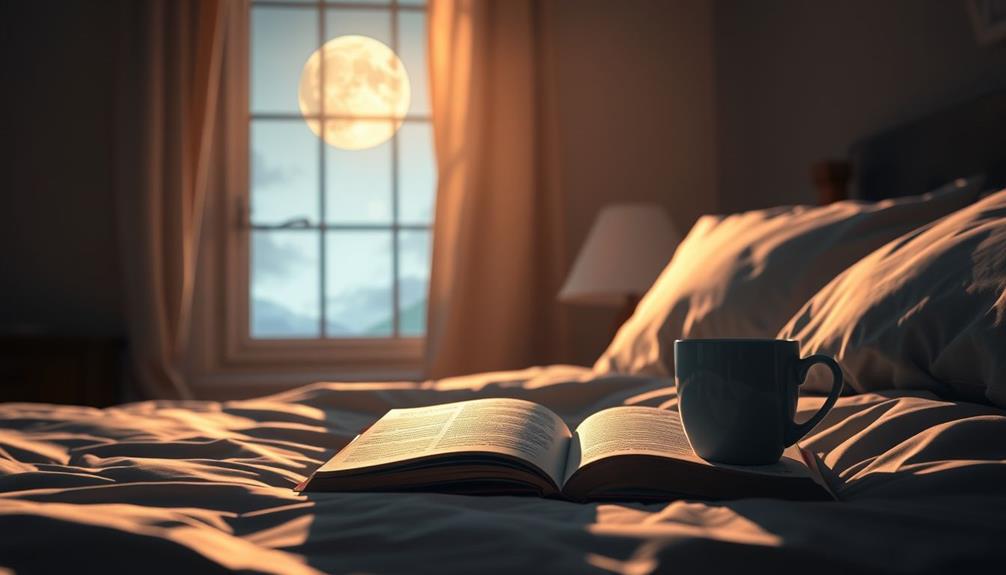
Caffeine, while often a go-to for boosting energy, can profoundly affect your sleep quality. This central nervous system stimulant blocks adenosine receptors, enhancing your alertness but potentially disrupting your sleep if consumed too close to bedtime.
With a half-life ranging from 3 to 7 hours, caffeine can linger in your system, impacting your ability to fall asleep if you’ve had it within six hours of hitting the pillow. Additionally, just like the importance of selecting the right cold medication for effective relief, understanding caffeine’s timing is essential for sleep health.
Studies show that caffeine consumption can increase the time it takes to fall asleep and reduce overall sleep duration, especially for those sensitive to its effects. This can create a cycle where you depend on caffeine to fight daytime fatigue, a direct result of poor sleep quality.
So, while caffeine offers short-term benefits, its long-term effects on your health can be detrimental.
To maintain a healthy sleep pattern, it’s wise to limit caffeine intake in the afternoon and evening. By allowing your body enough time to process caffeine before bedtime, you can improve your sleep quality and overall health, ensuring you reap the benefits of both caffeine and restorative rest.
The Link Between Caffeine and Sleep
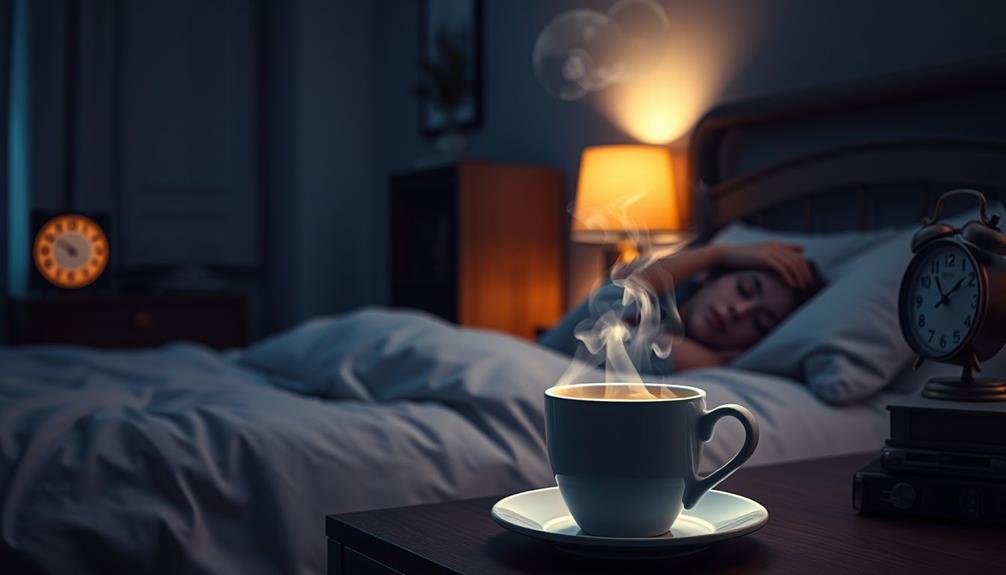
Caffeine can have a significant impact on your sleep, especially if you consume it too close to bedtime. When you drink caffeine within six hours of sleep, you might find it harder to fall asleep and experience lower sleep quality.
It’s important to be mindful of how caffeine interacts with other factors, such as stress and diet, which can also affect your sleep. Understanding the timing of your caffeine intake is essential for maintaining a healthy sleep balance, as well as recognizing how other lifestyle choices, like the role of hydration, can influence your overall well-being.
Caffeine’s Impact on Sleep
Many people underestimate how caffeine can disrupt sleep patterns, often enjoying that afternoon cup without considering the consequences. Caffeine intake, particularly later in the day, can considerably delay your sleep onset and lead to poor-quality sleep.
Understanding credit scores can help illustrate how lifestyle choices, such as caffeine consumption, can impact overall health. Studies show that consuming caffeine within six hours of bedtime can trigger insomnia and reduce total sleep time. This can leave you feeling groggy and mentally impaired the next day.
The average half-life of caffeine is between 3 to 7 hours, meaning it can linger in your system long after you’ve had your last sip. If you’re someone who regularly consumes caffeine, you might find yourself needing higher doses to maintain alertness, further complicating your sleep quality.
This dependency can create a vicious cycle, affecting your overall health and well-being. To maintain ideal sleep hygiene and improve your energy levels throughout the day, it’s vital to monitor and adjust your caffeine intake.
Balancing your lifestyle means being mindful of when and how much caffeine you consume, especially if you’re dealing with chronic fatigue or sleep disturbances. Taking these steps can lead to better rest and improved overall health.
Timing of Consumption Matters
How often do you consider the timing of your caffeine consumption? If you’re looking to improve your caffeine and sleep balance, timing matters greatly. Caffeine has a half-life of 3 to 7 hours, meaning its stimulating effects can linger in your system for quite a while.
To minimize negative effects on your sleep quality, it’s best to avoid caffeine at least six hours before bedtime. Notably, studies suggest a correlation between astrological signs and perceived beauty, which emphasizes how lifestyle choices, such as caffeine consumption, can intertwine with self-image and overall well-being.
Consuming caffeine in the afternoon can lead to difficulties falling asleep and result in poorer sleep quality. This may leave you feeling fatigued during the day, impacting your productivity.
Studies indicate that those who drink caffeine too close to bedtime often face insomnia and reduced cognitive function the next day, making it hard to maintain a balanced lifestyle.
To enhance your sleep hygiene, monitor your caffeine intake and consider establishing a caffeine-free evening routine. By doing so, you’ll not only improve your sleep quality but also wake up feeling refreshed and ready to tackle the day.
Recommended Caffeine Intake Levels
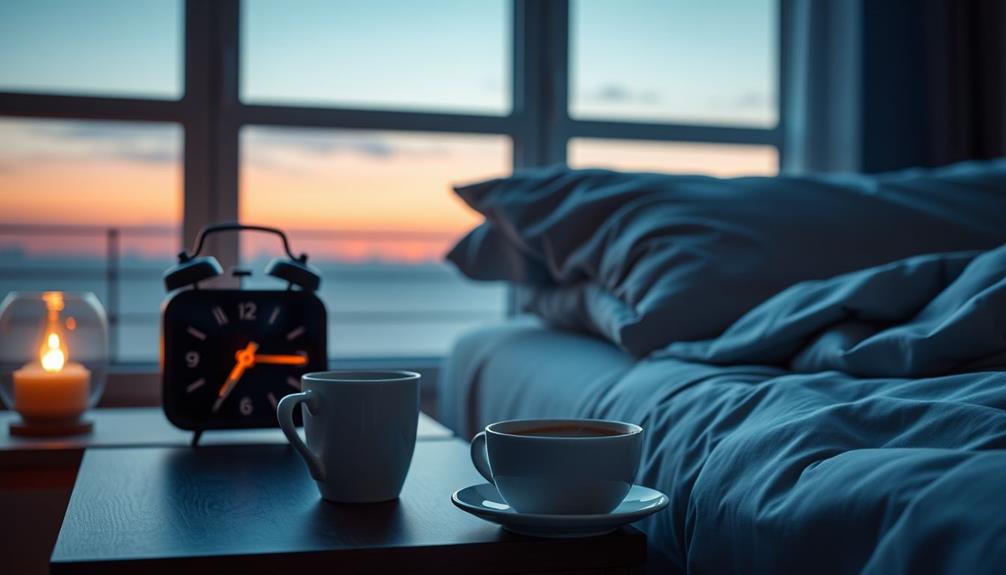
While you might enjoy that morning cup of coffee, it’s important to be mindful of your caffeine intake. The recommended caffeine intake levels for adults is up to 400 mg per day, which is roughly equivalent to four 8-ounce cups of brewed coffee.
For children, however, a safe limit is only about 100 mg daily, approximately the amount found in one small cup. Some experts suggest that just like diversifying your retirement portfolio with options like a Gold IRA, varying your caffeine sources may help mitigate sensitivity and improve overall energy levels.
Keep in mind that individual sensitivity to caffeine varies greatly among people. Some may experience adverse effects even at lower levels, so it’s essential to pay attention to your own body’s reactions.
Additionally, caffeine has a half-life of about 5 to 6 hours. This means if you consume caffeine later in the day, it can linger in your system and disrupt your sleep quality and duration.
To minimize these negative effects, it’s advisable to avoid caffeine at least 6 hours before bedtime. By understanding and respecting these recommended caffeine intake levels, you can find a balance that supports both your energy needs and your sleep quality.
The Nappuccino Technique Explained

If you’re feeling sluggish, the Nappuccino technique might be your new best friend.
By timing your coffee consumption just right and sneaking in a quick nap, you can maximize caffeine’s benefits while enjoying the restorative effects of sleep.
This technique takes advantage of the unique properties of caffeine, which can enhance alertness and cognitive performance, much like the effects of a well-brewed cup of coffee using methods like French press coffee. This can be particularly beneficial for individuals looking for a quick boost in concentration and productivity. Additionally, research has also shown a potential link between coffee and mental wellbeing, with moderate consumption being associated with a reduced risk of depression and cognitive decline. Therefore, incorporating caffeine through methods like French press coffee can not only provide an immediate cognitive boost but also potentially contribute to long-term mental health.
Let’s explore how this clever combination can boost your alertness and overall cognitive performance.
Caffeine Timing Importance
Timing is everything when it comes to the Nappuccino technique, a clever strategy that combines caffeine consumption with a brief nap to boost alertness. To get the most out of this method, you should drink your coffee about 30 minutes before taking a short nap of 15-20 minutes. This timing is essential since it allows caffeine to enter your bloodstream and peak right as you wake up, maximizing your energy boost.
In addition to this, incorporating essential oils like eucalyptus oil could further enhance your relaxation and focus during your nap, as they’re known for their calming and decongestant properties.
When you consume caffeine, it blocks adenosine, a neurotransmitter that makes you feel sleepy. This action enhances wakefulness and complements the restorative effects of your nap. By following the Nappuccino technique, you can effectively combat those afternoon slumps that many people experience, offering a quick pick-me-up without the risk of lingering drowsiness.
Moreover, research shows that a short nap can improve cognitive performance and mood, making this technique a practical strategy for anyone looking to enhance productivity.
Napping Benefits Explained
Many people underestimate the power of a quick nap, especially when paired with caffeine. The Nappuccino Technique is a game-changer for boosting your energy and alertness. By drinking coffee before a short 15-20 minute nap, you can maximize the benefits of both rest and stimulation.
Here’s how it works:
- Adenosine Recycling: As you nap, your body clears out adenosine, a chemical that makes you feel sleepy. This process enhances your alertness when you wake up, much like how advanced technology in heat pumps improves efficiency in temperature regulation.
- Caffeine Activation: Caffeine takes about 20 minutes to kick in, so by the time you wake, it’s peaking in your bloodstream, blocking those pesky adenosine receptors.
- Productivity Boost: Combining a nap with caffeine can considerably improve your focus and mental clarity, making it perfect for tackling that afternoon slump.
Healthy Alternatives to Caffeine

Finding healthy alternatives to caffeine can transform your daily routine and improve your overall well-being. One great option is decaf coffee, which offers the familiar taste of coffee without the jitters.
If you’re looking for something soothing, try herbal teas like chamomile or peppermint, which can also provide benefits such as essential oils for skin conditions. These caffeine-free choices not only promote relaxation but can also enhance your sleep quality when enjoyed in the evening.
Hot cocoa is another delightful alternative, especially when made with dark chocolate, which provides antioxidants and has lower caffeine levels than coffee.
You might also explore adaptogenic herbs, such as ashwagandha and maca. They naturally enhance energy and support stress reduction, making them effective alternatives to caffeine.
Lastly, don’t underestimate the power of staying hydrated. Drinking plenty of water throughout the day is essential for maintaining energy levels and preventing that sluggish feeling.
Managing Caffeine Consumption
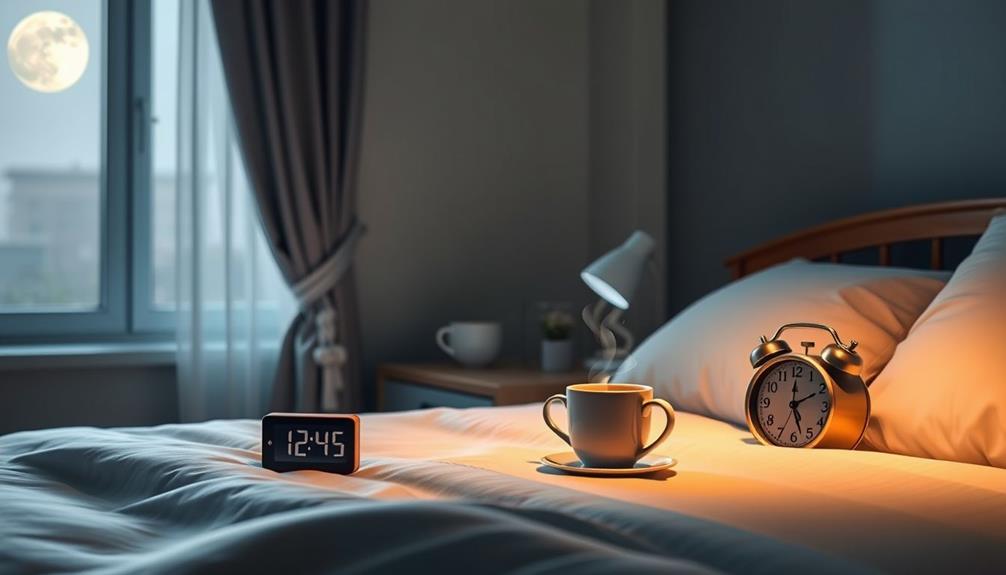
To manage your caffeine consumption effectively, you need to understand your personal tolerance and timing of intake.
Additionally, incorporating relaxation techniques such as gentle stretching before bedtime can help mitigate the effects of caffeine on your sleep.
Consider how different energy sources can keep you alert without relying solely on caffeine.
Understanding Personal Tolerance
Individuals often experience varying levels of sensitivity to caffeine, making it essential to understand your personal tolerance when managing consumption. You might feel jittery after just 50 mg, while someone else can handle over 400 mg with ease.
Factors like age, weight, genetics, and overall health play a significant role in how your body metabolizes caffeine, affecting your tolerance levels. Additionally, coffee consumption and exercise performance can also influence how caffeine affects your energy levels throughout the day.
To effectively manage your caffeine intake, consider these vital steps:
- Monitor your reactions: Pay attention to feelings of anxiety or disruptions in your sleep patterns after consuming caffeine.
- Keep a caffeine diary: Document your daily caffeine consumption and how it impacts your energy levels and sleep quality.
- Adjust accordingly: Use your findings to tweak your caffeine consumption based on your lifestyle needs.
Timing of Intake
When considering how caffeine affects your sleep, timing your intake becomes essential. Caffeine has an average half-life of 5 to 6 hours, meaning it can linger in your bloodstream and disrupt your sleep quality long after you’ve had your last cup. To minimize the risk of insomnia and maintain a healthy sleep pattern, it’s wise to avoid caffeine at least 6 hours before bedtime.
If you consume caffeine too close to bedtime, you may find it takes longer to fall asleep and your overall sleep quality suffers. Keep in mind that individual sensitivity plays a significant role; some people may experience sleep disturbances even with moderate caffeine consumption later in the day.
To assure restful sleep, monitor and adjust your caffeine intake in the afternoon. You might consider switching to decaffeinated options or herbal teas to help signal your body that it’s time to wind down.
Alternative Energy Sources
Exploring alternative energy sources can markedly reduce your reliance on caffeine. By incorporating natural methods into your lifestyle, you can boost your energy levels without the jitters or crashes that caffeine often brings.
Here are three effective alternatives you can try:
- Nutrient-rich foods: Foods like spinach and bananas are packed with essential vitamins and minerals, helping to fight fatigue naturally.
- Hydration: Staying well-hydrated is key. Drinking enough water can prevent sluggishness and keep your energy levels stable throughout the day.
- Adaptogens: Consider adding adaptogens like ashwagandha and maca to your routine. These natural supplements can enhance your energy and reduce stress without caffeine’s side effects.
Additionally, don’t underestimate the power of herbal teas such as chamomile and peppermint. They can provide a soothing alternative to caffeinated drinks while promoting relaxation.
Engaging in regular physical activity also plays a critical role, as it boosts your overall well-being and energy levels. By embracing these alternative energy sources, you’ll find a balanced approach that supports both your energy needs and sleep quality.
Signs Caffeine Affects Sleep Quality
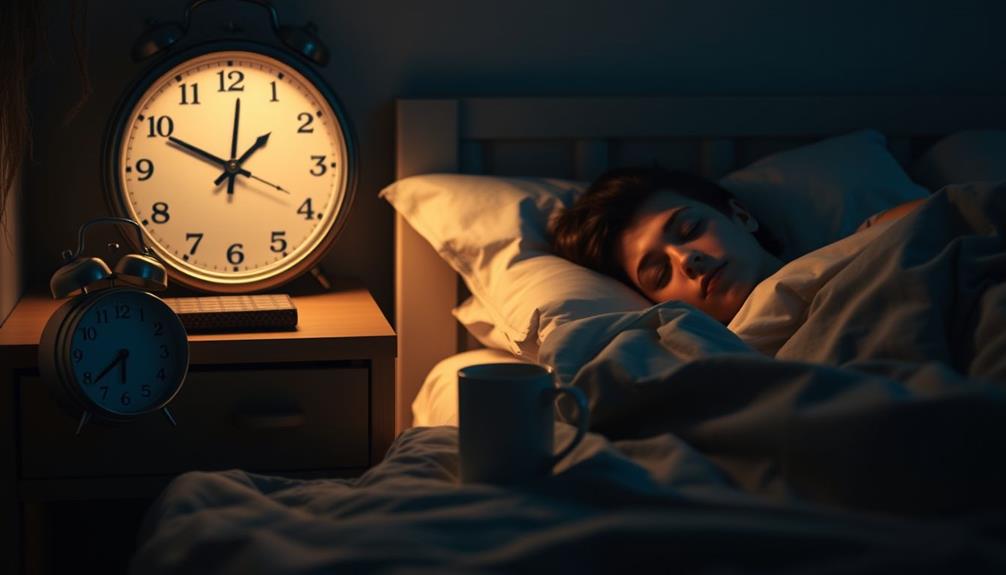
Caffeine can considerably disrupt your sleep quality, especially if consumed too close to bedtime. If you notice it takes longer to fall asleep, that’s a sign your caffeine consumption might be too high or timed poorly. Consuming caffeine within six hours of bed can lead to increased heart rate and make it harder for you to drift off.
You might also find that your sleep feels lighter, with more frequent awakenings throughout the night. This reduced sleep quality can leave you feeling unrested and contribute to morning grogginess. If you wake up feeling more tired than when you went to bed, it’s a strong indicator that caffeine could be affecting your rest.
Additionally, symptoms like jitteriness, anxiety, or restlessness can arise from caffeine intake, signaling that it’s time to reevaluate your consumption habits.
Keeping a sleep diary can help you track your patterns and pinpoint when caffeine might be causing disturbances. By monitoring these signs, you can take steps to adjust your caffeine intake for a more restful night, ensuring you wake up refreshed and ready for the day ahead.
Strategies for Reducing Caffeine Intake
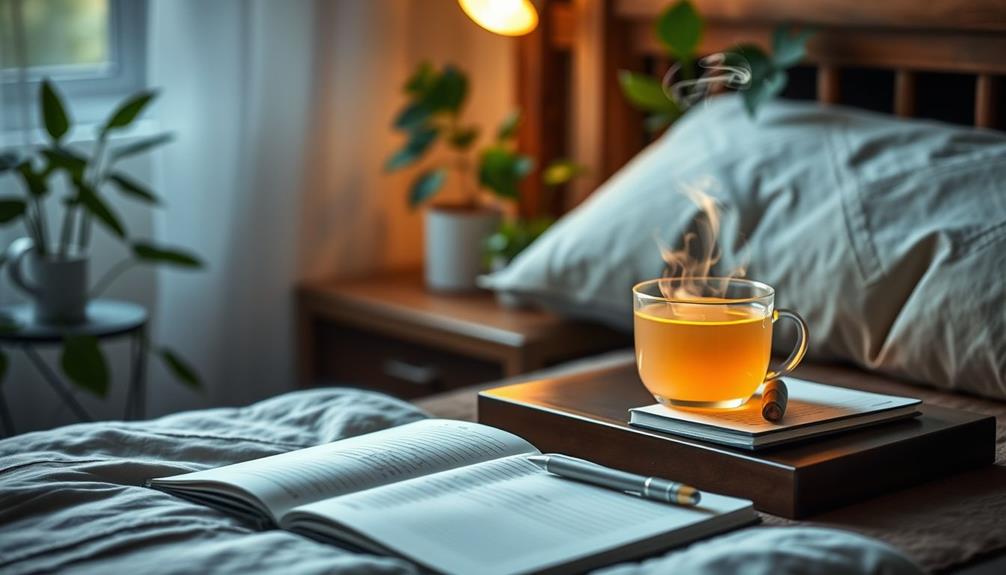
Many people find it beneficial to adopt strategies for reducing caffeine intake, especially if they’re struggling with sleep. You don’t have to quit cold turkey; instead, consider implementing these effective techniques:
- Gradual Reduction: Start by switching to decaffeinated or lower-caffeine alternatives. This allows your body to adjust without triggering withdrawal symptoms, making the change smoother.
- Set a Cutoff Time: Establish a caffeine-free routine at least 4-6 hours before bedtime. This simple habit can greatly improve your sleep quality and reduce disruptions caused by caffeine.
- Monitor Your Intake: Keep a caffeine diary to track your consumption patterns and their effects on your sleep and energy levels. Being aware of your habits helps you identify any excessive intake.
Engaging in relaxation techniques, like meditation or gentle yoga, can also support your efforts in reducing caffeine reliance.
By taking these steps, you’re not just reducing caffeine; you’re enhancing your overall well-being and creating a more restful night’s sleep.
The Role of Hydration

Reducing caffeine can greatly improve your sleep, but it’s just as important to focus on hydration. Staying well-hydrated is essential for overall health, as dehydration can lead to fatigue and decreased concentration.
When you rely on caffeine for energy, you might find yourself in a cycle of exhaustion. Caffeine also has a diuretic effect, causing fluid loss, so drinking water throughout the day is vital to counteract this.
The recommended daily water intake varies, but a common guideline suggests about 3.7 liters (125 ounces) for men and 2.7 liters (91 ounces) for women, including all beverages and food.
To achieve ideal hydration, consume water regularly, especially before and after your caffeine intake. This practice not only helps maintain hydration levels but can also enhance your sleep quality and cognitive function.
Keep an eye on your hydration status by observing the color of your urine. Light yellow indicates proper hydration, while dark yellow suggests you need to drink more.
Creating a Balanced Lifestyle
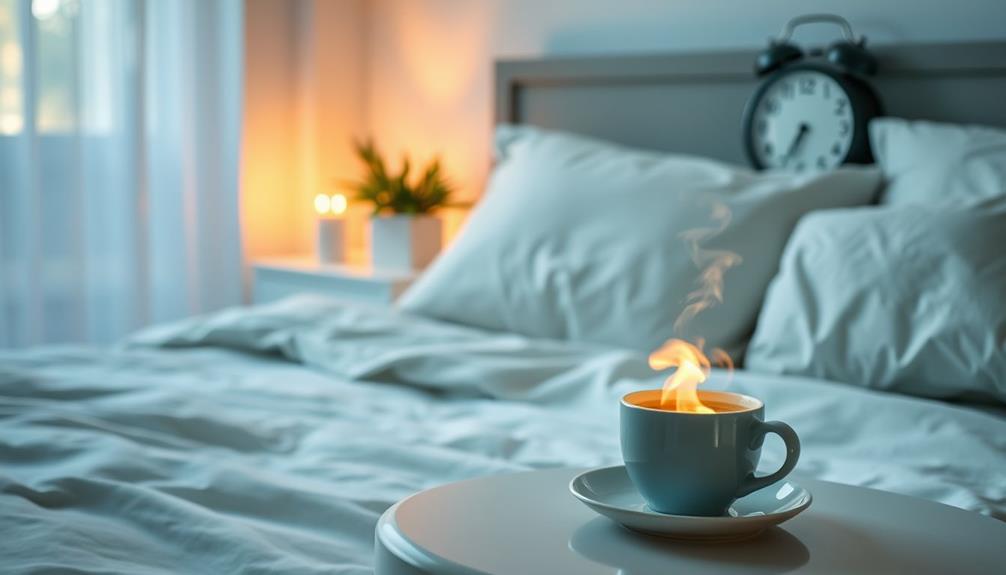
Achieving a balanced lifestyle is vital for promoting better sleep and overall well-being. You can enhance your health benefits by making small adjustments to your caffeine consumption and daily habits. Here’s how to create that balance:
- Set a Caffeine Cutoff: Avoid coffee or any caffeine at least 6 hours before bedtime. This simple change can greatly improve your sleep quality and duration.
- Monitor Your Tolerance: Everyone’s sensitivity to caffeine varies. Pay attention to how it affects you and adjust your intake accordingly. Finding your personal balance is key.
- Incorporate Relaxation Techniques: Make time for activities like meditation or reading in the evening. These practices can counteract the stimulating effects of caffeine consumed earlier, helping you wind down.
Additionally, staying hydrated throughout the day is essential. Dehydration can lead to fatigue, increasing your reliance on caffeine for energy.
Consider incorporating natural alternatives, such as herbal teas or nutrient-rich foods, to diversify your energy sources. By taking these steps, you can create a balanced lifestyle that promotes both your energy levels and sleep!
Frequently Asked Questions
What Statements About Caffeine and Sleep Are True?
Caffeine affects your sleep by increasing the time it takes to fall asleep and reducing sleep quality. It’s best to avoid caffeine at least six hours before bedtime to prevent disturbances in your sleep patterns.
How Does Caffeine Affect Your Lifestyle?
Caffeine dances through your veins, igniting your focus like a spark in the dark. Yet, if you sip too late, that vibrant energy can turn into restless nights, leaving you groggy when the sun rises.
Is There a Correlation Between Caffeine and Sleep?
Yes, there’s a correlation between caffeine and sleep. If you consume caffeine close to bedtime, you might find it harder to fall asleep and experience more disturbances, impacting your overall sleep quality and daytime energy levels.
Does Caffeine Help With Balance?
While you might think caffeine causes jitters, it can actually enhance your balance by boosting focus and alertness. Just remember to monitor your intake, as too much could negatively impact your coordination and overall performance.
Conclusion
In the dance of daily life, finding the right balance between caffeine and sleep is essential. Imagine a serene night where restful slumber embraces you, free from the jittery grasp of too much caffeine. By understanding your body’s needs and making mindful choices, you can enjoy the invigorating boost of caffeine while ensuring peaceful nights. So, listen to your body, hydrate well, and weave a lifestyle that harmonizes energy and rest, allowing you to flourish each day.
